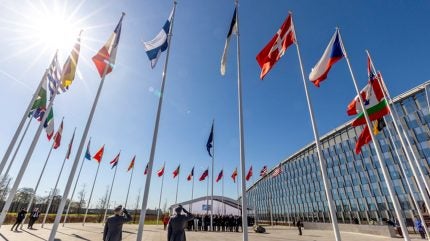
As world leaders convene in Washington DC from 8 to 11 July for the 75th Nato Summit, the agenda will be dominated by discussions on delivering defence and deterrence in support of Ukraine during its ongoing conflict with Russia.
Putting these discussions into context, a recent survey by the European Council on Foreign Relations (ECFR) has revealed a complex and somewhat contradictory landscape of public opinion across Europe regarding these issues.
The ECFR’s multi-country survey paints a detailed picture of European attitudes toward the conflict in Ukraine, revealing both strong support and significant reservations among the populace. One of the most striking findings is the robust backing for increasing the supply of weapons and ammunition to Ukraine. An outlier in the survey group, Estonia hosts a remarkable 74% of respondents that consider the supply a ‘good idea’, reflecting the country’s acute awareness of the threat posed by its eastern neighbour. Still, majorities in Sweden, Poland, Great Britain, the Netherlands, and Portugal echoed the sentiment, signalling a broad, albeit not universal, consensus for continuing to support Ukraine’s military capabilities.
However, this support does not translate seamlessly into a willingness to increase domestic national defence spending. Out ahead, Poland has 53% of respondents prepared to allocate more funds to defence, even if it means cutting budgets for health, education, and crime prevention. Estonia, Sweden, and Germany show similar, though less pronounced, support. However, in many other countries, including Italy, Greece, Spain, and Switzerland, the majority opinion is firmly against increasing defence expenditures. This dichotomy underscores a key tension: while Europeans largely support aiding Ukraine, they are wary of sacrificing their domestic welfare budgets to do so.
This cautious approach extends to the prospect of sending troops to Ukraine. Across all surveyed countries, majorities are staunchly opposed to deploying their soldiers into the conflict zone. Even in Sweden, where support for Ukraine is strong, 54% of respondents reject the idea of committing troops. This reluctance reflects a broader European hesitation to become entangled in direct military engagement, favouring instead support roles such as providing technical assistance or patrolling borders. In Bulgaria, 90% of respondents are opposed to committing troops.
Further complicating the picture is the perception of Russia’s military strength. Majorities in Ukraine and most European countries see it as a significant barrier to Ukraine reclaiming its territory. This view is most pronounced in Ukraine itself, where more than 81% of respondents regard Russian military power as a formidable obstacle. Sweden, however, is an outlier, with a lower percentage perceiving Russia’s military as a major threat, at only 56%.
How well do you really know your competitors?
Access the most comprehensive Company Profiles on the market, powered by GlobalData. Save hours of research. Gain competitive edge.

Thank you!
Your download email will arrive shortly
Not ready to buy yet? Download a free sample
We are confident about the unique quality of our Company Profiles. However, we want you to make the most beneficial decision for your business, so we offer a free sample that you can download by submitting the below form
By GlobalDataThe survey uncovers a deep-seated scepticism about Ukraine’s chances of defeating Russia on the battlefield. In most countries, a negotiated settlement is seen as the most likely outcome. Estonia stands alone with a plurality believing in a Ukrainian victory, though this optimism rises across Europe if Ukraine receives increased military aid, with a larger share of respondents responding in the affirmative under those circumstances. Nonetheless, the prevailing sentiment remains one of caution and pragmatism, with many Europeans doubting a clear-cut military resolution to the conflict.
Within Ukraine, the survey reveals profound divisions over potential trade-offs to end the conflict. 71% of Ukrainians reject the notion of joining Nato if it means not reclaiming occupied territories. 45% indicated that they would prefer to lose parts of their currently occupied territory but remain sovereign “with its own army and freedom to choose its alliances like the EU and Nato”. When considering trade-offs, such as losing some territory but retaining sovereignty and access to international alliances, opinions are split, reflecting complex and painful choices facing Ukrainians as they navigate their future.



